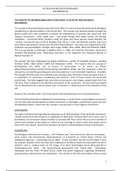RST2603 NEW RELIGIOUS MOVEMENTS
ASSIGNMENT 06
THE CONCEPT OF BRAINWASHING AND ITS RELEVANCE TO SELECTED NEW RELIGIOUS
MOVEMENTS
The concept of brainwashing was conceived in the 1950’s as a term to describe political and ideological
conditioning of captured soldiers in the Korean War. The concept soon became popular amongst the
general public and some academics to explain the phenomenon of persons who would join new
religious movements – then called cults – and would change their belief system and lifestyle
completely. Concerned family members could not grasp why these persons would abandon the
“normal”, mainstream way of life to dedicate their life to a “cult” and believed that the cults must
have had an extraordinary control over the will of their followers. The notion was supported by some
academics and psychologists, amongst them Singer (1995), Lifton (1956, 1961) and Zimbardo (1969).
The concept gained considerable credibility when, in 1980, the American Psychiatric Association
included brainwashing under “dissociative disorders” in the Diagnostic and Statistical Manual of
Mental Disorders-III.
The concept was later challenged and largely refuted by a number of reputable scholars, including
Anthony (1980, 1989), Barker (1984) and Richardson (1983). The reasons why the concept of
brainwashing has fallen out of favour is summarised in an article by Moore
(http://theconversation.com/the-brainwashing-myth-99272; 2018). Her first contention is that the
concept has no scientific grounding and cannot be proved as it is an untestable hypothesis. Secondly,
the changes that take place in an individual upon joining a new movement may be ascribed to one, or
a combination of, conversion, conditioning and coercion. Each of these actions can be proved
scientifically. She lastly suggests that, even after converting to a new religion, people retain their free
will; they chose to believe in the doctrines and actions of the movement. The fact that these beliefs
can be abandoned once a person leaves such a movement, is listed as proof of the retention of free
will.
Based on the scientific proof, I am of the opinion that brainwashing is not a real phenomenon.
The fact that the phenomena attributed to brainwashing, or mind control, in new religious movements
can and have been equally applied to political convictions or ideologies, relationships, sports and even
the gambling industry, means that the concept is not particular to new religious movements.
SPIRITUALISM
No claims could be found regarding the supposed use of “brainwashing” in the Spiritualist movement.
I would contend that the concept is not applicable to Spiritualism, because there are no strict rules in
Spiritualism, the movement allows members to proceed with their secular life as normal member of
society and members of the public are invited to join meetings or seances when they please and to
leave when they please. None of the attributes ascribed to brainwashing are found in Spiritualism.
SCIENTOLOGY
Scientologists claim that their founder, L. Ron Hubbard, was “one of the first to discover and expose…
mind control and brainwashing experimentation as conducted by United States military and
intelligence agencies…” (scientology.org.za, 2019). Former members, like the current leader’s niece
for example, however claim that they were subjected to conditions meant to break down the will of
followers and to conform them to the image of an ideal Scientologist (Jenna Miscavige-Hill in
independent.co.uk, 2013). The award-winning documentary film “Going Clear: Scientology,
Hollywood and the Prison of Belief (2013) made very public allegations regarding intimidation,
physical abuse, imprisonment and exploitation. The director of the film, Alex Gibney, cited a reason
1




